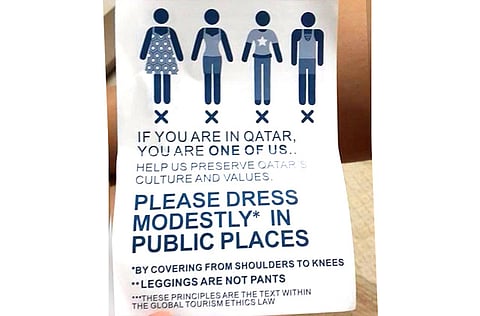Qataris launch 'modest dress' campaign
Activists insist on need to resist cultural invasion to preserve local values

Manama: A campaign to promote “modest dresses” among expatriate residents and visitors will be launched in Qatar next month.
The campaign urges respect for the local dress code by stating that whoever was in Qatar was a member of the country’s community.
“If you are in Qatar, you are one of us,” the campaign says. “Help us preserve Qatar’s culture and values. Please dress modestly in public places.”
The campaign on its posters and online messages defines “modestly” as “covering shoulders and knees.”
The attires that should not be worn are posted on the campaign’s Twitter account @reflect_respect.
According to local daily Al Sharq, the campaign will be formally launched on June 20 by a group of Qatari women who wanted to protect the country’s social values by “promoting modesty in all public places and preventing immoral behaviour.”
The activists said that foreign attitudes, including dress codes, “have become a threat to the Qatari identity and a terrible omen for the future generations.”
“We do not want our children to get used to these behaviours that pose a threat to the identity of the new generations, and our goal is to instill in our children pride in their local and religious values,” Om Abdullah, the leader of the campaign, said, quoted by the daily last week.
“As people chose to ignore this cultural invasion, our young people started, under the deceiving motto of modernism, to adopt negative attitudes, instead of resisting them. One immediate issue is the fact that wearing clothes considered as an abrasion of modesty in public places has prevented many families from frequenting these places, which deprived them of enjoying relaxation in their own country,” she said.
The activists insisted that their efforts were an individual initiative and hoped religious, social and media figures would join in their campaign to help promote the country’s values.
The initial details about the campaign have triggered a wave of sympathy and condemnation in equal measures.
On the Facebook page discussing the issue, Angie Florendo Brimbuela posted: “Since we are in a Muslim country there is nothing wrong to follow their dress code. Thumbs up for that... especially holy month of Ramadan is very near.”
Sana Afzal-Fawad said it was “about time something was done about this.”
“It is getting hard to walk into a mall without noticing the amount of uncovered legs and arms these days.”
Inas Abu Alsaud cautioned against rushing to negative conclusions.
“It doesn’t say to cover from head to toes just shoulders to knees so shorts and knee length and short sleeve tops are pretty much still summer. Leggings are not pants. They are made to have something long worn on top.”
For Basem El-Sayed, respect is imperative.
“Asking people to dress modestly is negative, forceful and abusive. But forcing girls to remove their hijab in the advanced countries is cool and democratic and suits the freedom of choice. Stop your double standard; it is disgusting.”
However, other users dismissed the campaign.
“Every summer they do the same. Boring idea. They should focus on more important things rather than people dress,” Khaled El Gazzar posted.
Maher Al Shaaban said other issues were more important.
“And suddenly the most critical issue in Qatar is not the choking traffic, and it’s not the labor law, and it’s not the abusive driving on roads, ladies and gentlemen it’s what you wear to the mall,” he said.
For Jacque R Scott, the situation is not easy.
“This is a tough one because although I believe one must be respectful, I couldn’t imagine telling someone in Europe or anywhere that they mustn’t be covered up because it’s not our culture or religion. Although I am aware some places in the world try to insist ladies mustn’t wear headwear etc, there is always an outcry about this. This poster is exactly the same as this in reverse. Also where do you draw the line in offending people? Some ladies are totally covered up, are they then not offended by the ladies that don’t cover their faces?”
Daniela Selentiak insisted that the West did not impose a dress code.
“But when you come to our western countries we do not enforce our dress codes on you. Bear that in mind,” she said.
For Matias Alexandro, the population in Qatar is made up mainly of foreigners with different views.
“The percentage of Qatari people is under 10% and the rest are expats. That means it is a multinational country.”



